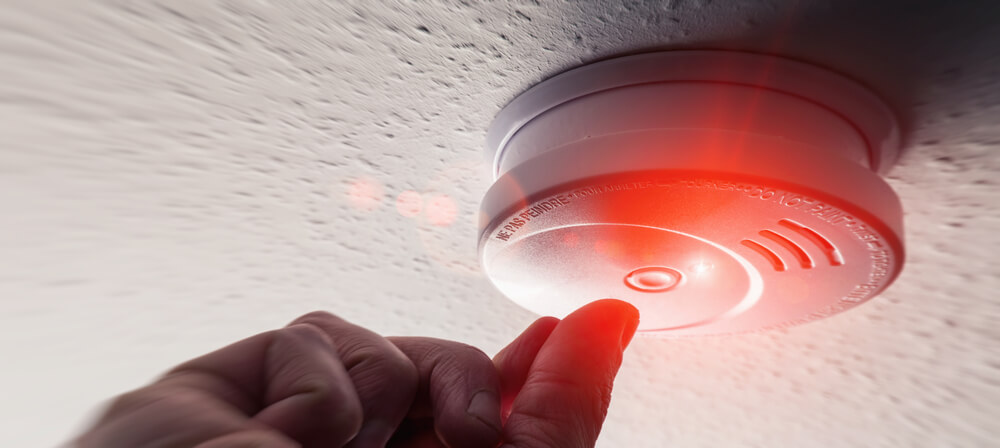There are many things that could be behind your smoke alarm beeping or chirping at intervals, or even, seemingly, at random. Local electrical contractors in Newport, Oakley Electrical Contractors, explains that there are a few factors that could be behind this annoyance, and how you can address them so that your smoke alarm stops beeping.
The Battery Isn’t Properly Installed or is Running Low
If the battery in your smoke alarm isn’t properly installed, it could be beeping to alert you to this fact. Here’s how to find out if this is the case:
- Check to make sure the battery is the right type for the smoke detector
- Ensure that it is properly installed with the positive and negative contacts are touching the appropriate spots
- Check the battery’s use-by date
- Make sure the battery door is closed firmly
- Disconnect and carefully reconnect the battery and see if the problem persists
- Try replacing the battery with a newer one
The Sensor Is Dirty or Blocked
Your smoke alarm uses a sensor to detect smoke and heat. If this sensor, or the sensing chamber that houses it, becomes contaminated with dust, dead insects, or other dirt, your smoke alarm may alert you. It’s a good idea to clean your smoke alarm thoroughly according to the manufacturer’s instructions whenever you change the battery. Even if you do, you might want to troubleshoot to make sure that this isn’t the problem.
- Remove the battery and use a compressed air cleaner to clear out any openings on the exterior of your smoke alarm
- If you don’t have a compressed air cleaner, try using a vacuum to remove dust and debris after removing the battery
- Wipe down the exterior of the smoke alarm with a damp cloth
- Reinstall the battery and test your smoke alarm by pressing the test button, if applicable
Environmental Factors
Sometimes the problem isn’t with the smoke alarm at all—sometimes it’s something in the environment (aside from smoke) that is causing the issue. Check to see if your smoke alarm is reacting to:
- Humidity, condensation or steam—even if your smoke alarm has been fine in the past, changing conditions can result in higher humidity or more condensation forming on the smoke alarm. Extreme temperatures changes, unusually high humidity, or new sources of steam can affect your alarm.
- Excessive airflow near the alarm—this could be due to a heating or cooling register, an open window, or even a ceiling fan. Check by moving the alarm away from these areas to see if the problem persists. Your manual will also have information about placing the smoke alarm in an appropriate area.
- High temperature—most smoke alarms function best below 95 degrees
Your Smoke Alarm May Need to Be Reset
If your smoke alarm has suffered from any of the above issues, it’s a good idea to reset it after you fix the problem. Usually, a smoke alarm automatically resets when the battery is changed, but sometimes it will still require a manual reset.
It’s important to follow the instructions in your smoke alarm manual when it comes to resetting it. Usually, they will be something like this:
- If your smoke alarm is wired into your home’s electrical system, you may need to turn off power to the alarm at the breaker.
- Then, remove it from the wall and disconnect it from the wiring.
- Remove the battery.
- Hold the test button for around 10-15 seconds, or until it stops beeping.
- Reinstall the battery, reconnect the power, and remount the alarm.
There May Have Been a Power Interruption
If your power went out or even surged or flickered, and your smoke alarm is wired into your home’s power system, then it may need to be reset.
- If this tends to happen around the same time every day, without your noticing an interruption in power, then it could be due to the electric company switching grids.
- If the beeping happens when you turn on another electrical appliance, like an exhaust fan, a hair drier, or a heater, it could be that the breaker the alarm shares with this appliance is being maxed out. Try moving the smoke alarm or the other appliance to a different area that is served by another breaker.
You May Need to Replace Your Alarm
If you’ve checked all of the above and your alarm is still malfunctioning, it may be time for a replacement. It’s usually a good idea to replace your alarm every 10 years, according to the US Fire Administration.
Also, check to see if your alarm has been subject to any government recalls.
If it is still under warranty, contact the manufacturer—they may send you a new alarm without charging you. If not, you’ll want to find a good replacement that meets the standards of the United States Consumer Product Safety Commission.
You shouldn’t allow your home or your family to be placed in danger due to a malfunctioning smoke alarm. Don’t take chances with your safety!

